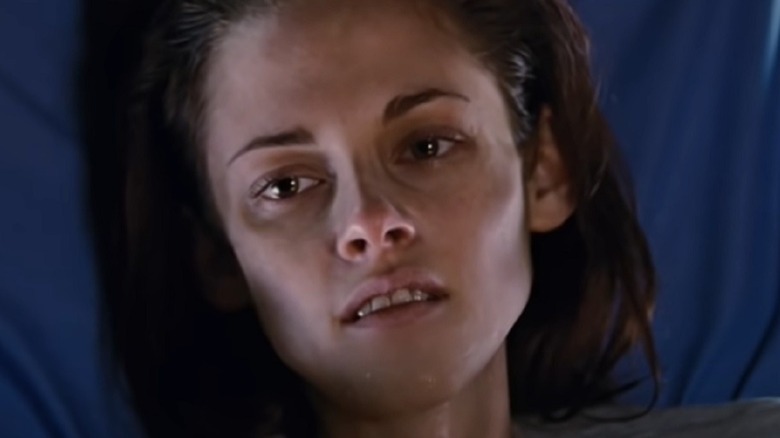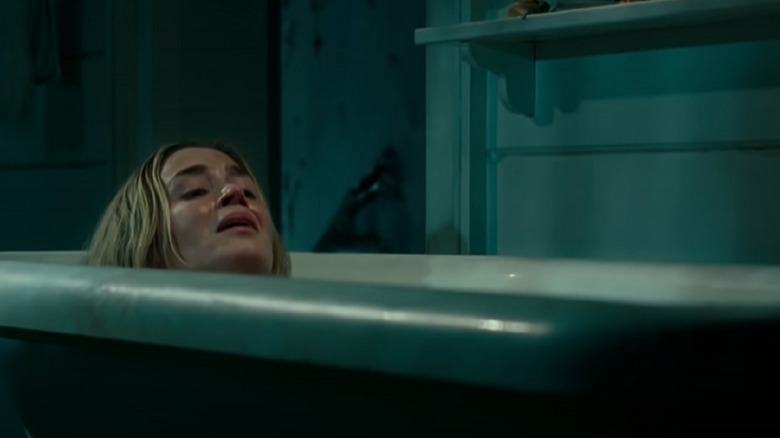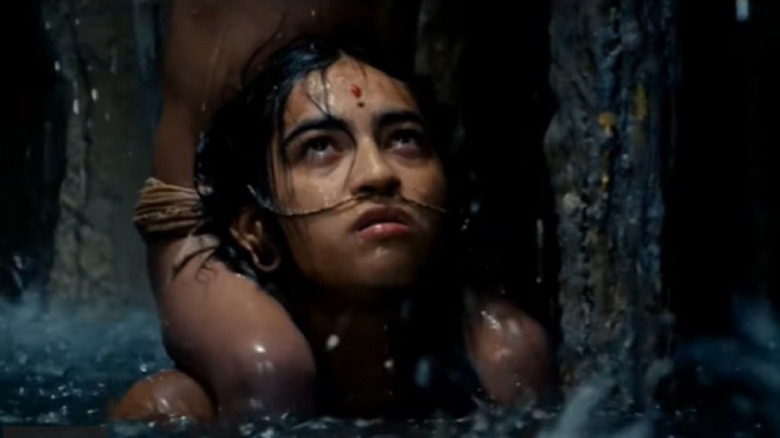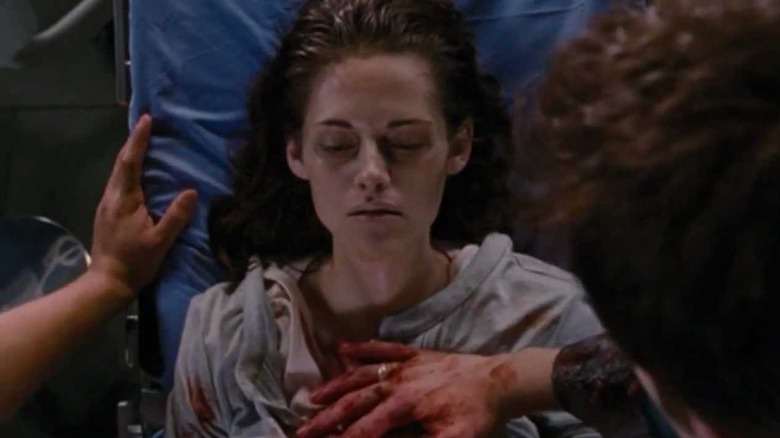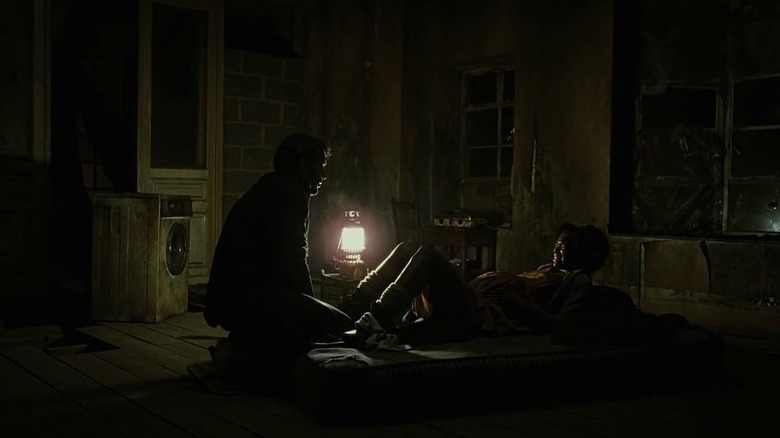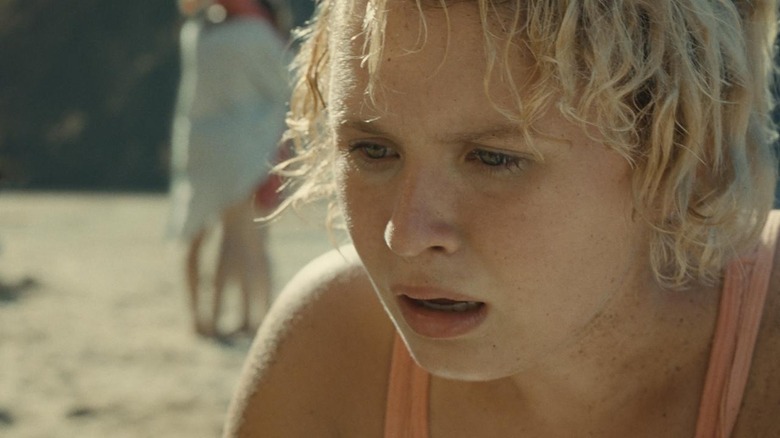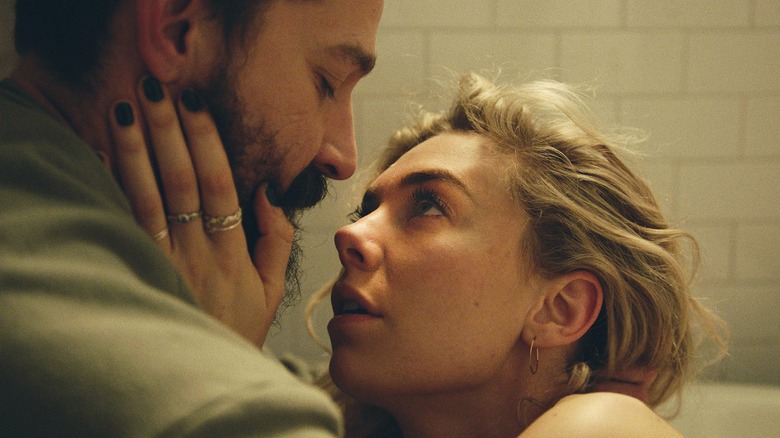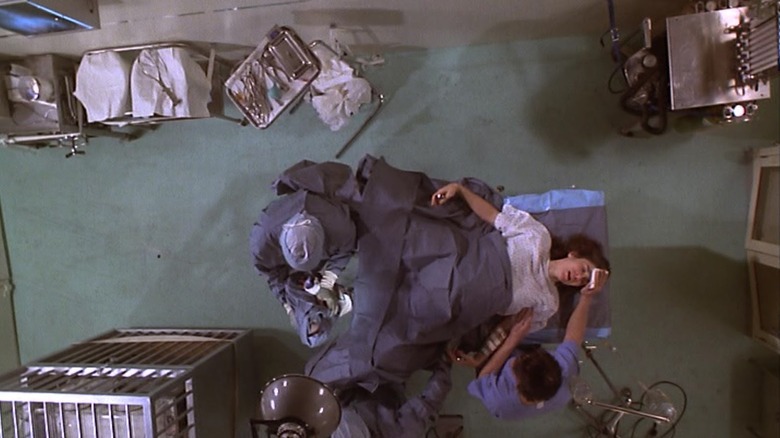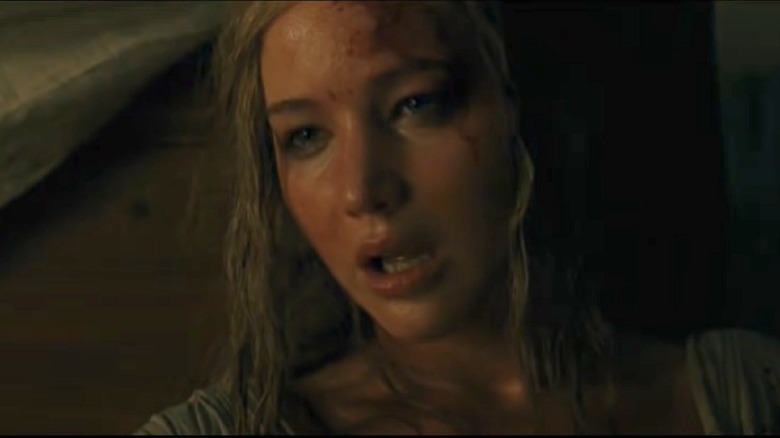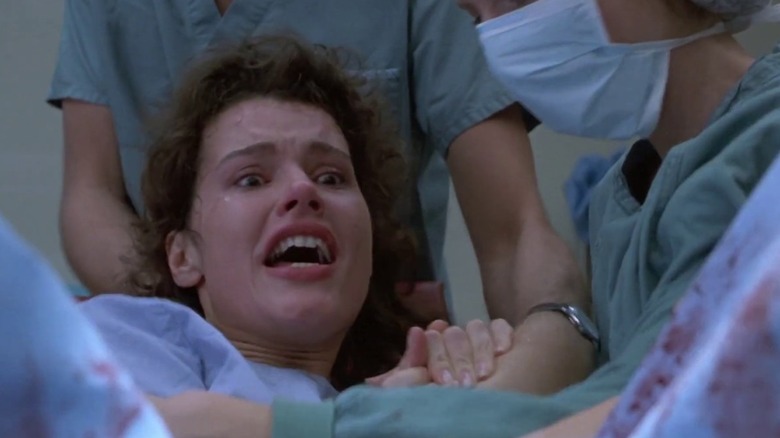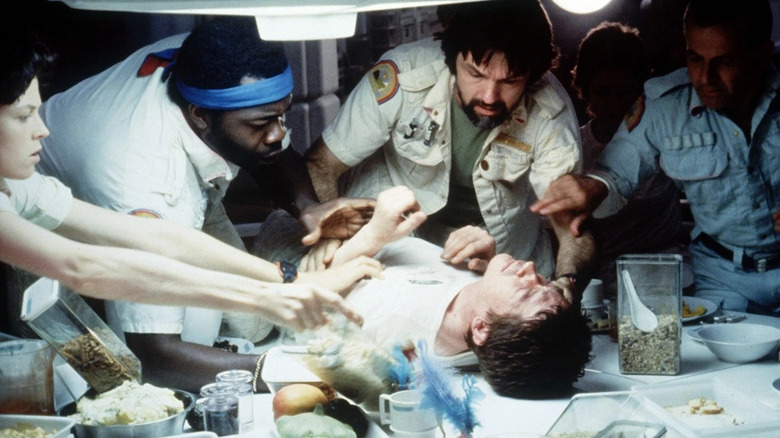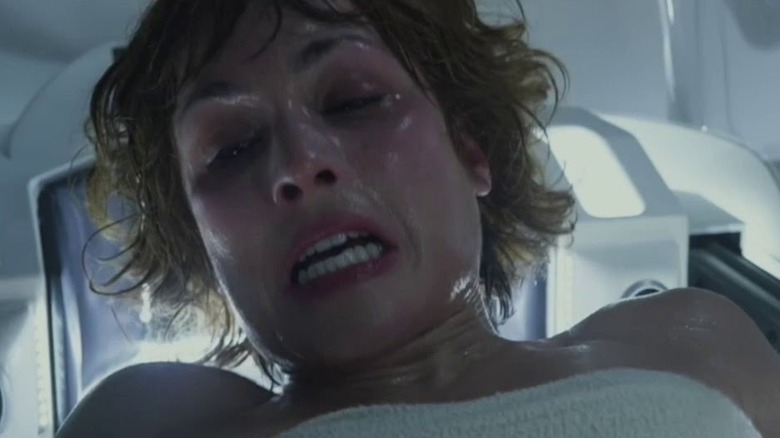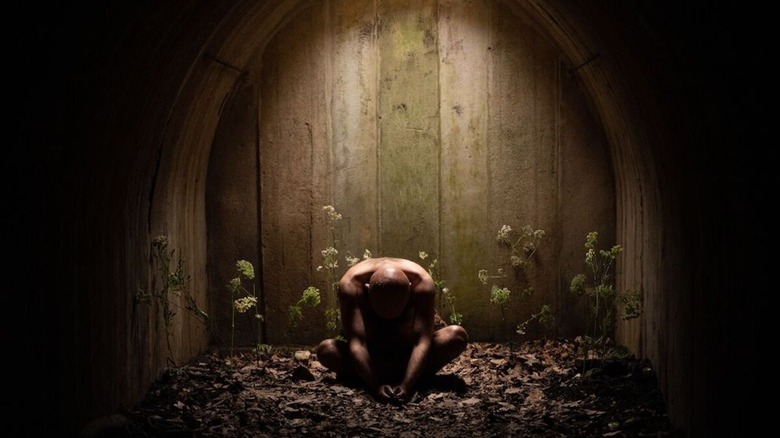The Most Disturbing Birth Scenes In Movie History
The human body is capable of doing amazing things, but they are often pretty disturbing. Such is the case with pregnancy and childbirth. Because bearing children is such an important part of life, it's also a frequent subject of many, many stories. Sometimes, the arrival of a new baby serves as the blessed beginning or happy ending to a romance. Other times, the vulnerability and absurdity associated with the birthing process make it great fodder for gross-out comedy. In the majority of those cases, birth is a plot point or a joke, and a realistic depiction of the process is rarely the goal. Water breaks, women scream, then in the next scene, they're dewy-faced and holding a far-too-clean newborn.
Some movies aren't afraid to show childbirth in all its protracted pain, high risk, and natural gore, though. Maybe because of the inherent stakes and shock value, pregnancy and delivery often serve as climactic moments in dramas, thrillers, and even supernatural horror and science fiction films. Cinematic births can be difficult to sit through for a number of reasons. Some are too realistic for comfort. Some pervert the phenomenon for over-the-top or out-of-this-world purposes. And, as is reflected in real life, sometimes the outcome of a birth-gone-wrong is worse than all the contracting and pushing could ever be. Here's a look at some of the most distressing births the big screen has to offer so far.
A Quiet Place
For most people, the ideal birth scenario is a well-equipped hospital room or home setting with a doctor or doula coaching the expectant mother through all the rhythmic breathing and power-inducing grunts and groans. Once the baby's born, its cries are a relieving sign of vitality. Usually, though, there aren't giant, ravenous aliens called Death Angels lurking around every corner like what poor Evelyn Abbott is up against in John Krasinski's 2018 post-apocalyptic horror "A Quiet Place."
In the film, sightless aliens with supersonic hearing hunt down anything that makes a sound. The Abbotts lose one young son to a heartbreaking attack, and a year later, Evelyn is visibly pregnant with their fourth child. The family has designed their entire lives around the goal of keeping quiet (using sign language thanks in part to having a deaf daughter), so Evelyn plans to manage any potential noisiness related to her birthing process. Things are worse than she expects, though, when she suddenly goes into labor alone and steps on a rusty nail. Screaming is a big no-no in "A Quiet Place," so she has to keep it together as she painfully climbs her way to the upstairs bathroom, her foot bleeding and her cervix dilating all the while. Then, she has to deliver the baby herself in a cruddy bathtub without making so much as a peep, as Death Angels lurk nearby and listen intently for her to make a mistake. As soon as the newborn wails, Evelyn retreats to a flooding basement where she has to hide her baby in a box, then hide herself from the monsters and hope for the best.
Apocalypto
2006's "Apocalypto" is a fraught but thrilling movie with an equally fraught but thrilling birth scene near its conclusion. The movie was released shortly after writer-director Mel Gibson's infamous arrest for DUI, during which he infamously shouted out some heinous anti-Semitic statements, and the reactions were mixed; some consider the film a masterpiece, while others critiqued his culturally inaccurate and overly bloodthirsty portrayal of his subject.
In the story, Jaguar Paw's tribe is raided by Zero Wolf's tribe, who burns most of the village to the ground, kills or captures the men, and leaves the few remaining children to fend for themselves. Jaguar Paw's father, the chief, is murdered and he's taken prisoner, but not before he can hide his pregnant wife Seven and their son Turtles Run in a deep forest pit. Seven's pregnancy is Chekhov's baby, and she's stuck at the bottom of that pit for a long time before her husband can fight his way to freedom and come back for her. She starts having contractions just as the waters from a heavy rainstorm begin to spill into her hidey-hole. An incredibly stoic Seven gives birth standing up and holding firm to a tree root, as she tries to keep her own head above water, with Turtles Run carefully balanced on her shoulders. This is anything but a new-age water birth. Seven's baby comes into the world amongst violent waters and even more brutal violence upon the land.
The Twilight Saga: Breaking Dawn - Part 1
In the first half of the two-part adaptation of Stephenie Meyer's "Breaking Dawn" Bella's pregnancy and resulting childbirth become the main storyline in "The Twilight Saga: Breaking Dawn – Part 1." Now, pregnancy, labor, and delivery are no walk in the park for anyone, but being knocked up with a vampire's kid makes everything much worse.
After Bella and Edward Cullen marry, they have sex on their honeymoon, and — two weeks later — the new bride suspects she might be pregnant. Since the father is a vampire, the fetus is developing at twice the rate of a human baby. Worse, the human-vampire hybrid baby is likely to kill Bella, which leads to a standoff between Bella and the vampires who think she should terminate and the werewolves who think both mother and child should be killed to avoid a calamity. However, Bella wants the child despite the fact that she's pretty obviously dying — and she has to drink blood to appease her growing bundle.
When Bella needs an emergency C-section, it's a ghastly scene as Edward performs the procedure and the werewolf boy who still has feelings for her watches on. Jacob considers killing the baby girl after the birth appears fatal for Bella, but he accidentally "imprints" on the babe instead, marking her as his future love interest. Meanwhile, Edward turns Bella into a vampire so she'll survive after her heart eventually stops. At the end of the whole strange, bloody affair, the Cullens are one big, happy family. But the process of bringing baby Renesmee into the world is a disturbing one indeed.
Children of Men
Alfonso Cuarón's critically acclaimed 2006 film "Children of Men" is entirely about the birth of one very important child. In this particular dystopian version of the year 2027, no babies have been born and survived for almost two decades. That's thrown the civilized world into chaos; few functional societies remain as people panic and struggle to comprehend the coming extinction of the human race.
Theo, a British government employee, is kidnapped by an activist group run by his ex-wife Julian with whom he shared a child named Dylan who died in an earlier pandemic. Julian tasks him with finding a way to get a refugee named Kee to a supposedly safe group of scientists known as the Human Project. They're working to figure out what's behind mass infertility. Kee is of use to them, it turns out, because she is the only known pregnant woman on Earth, but that also means there's a bounty on her. Theo has to pull strings and watch his and Kee's back as various forces — the British military, revolutionaries and refugees, mutineers in their own circle — conspire against them.
As their allies are picked off one by one, Kee starts having contractions. Theo has to help her deliver the baby in a dark room and in secret as a war breaks out on the other side of the door. As if having a baby under those circumstances, isn't stressful enough, after she gives birth, Kee and her baby are almost immediately kidnapped. Theo has to brave the gunfire between the fighting factions to get mother and child to the vessel that's come to rescue them, the Tomorrow.
Old
M. Night Shyamalan's 2021 high-concept horror film "Old" imagines what would happen if we all aged really fast. Well, for starters, kids would grow up in the blink of an eye. Guy and Prisca Cappa witness (and experience for themselves) precisely that phenomenon when they accept an ill-intended invitation to unwind on a beautiful but cruelly enchanted beach with their young children, Maddox and Trent, and three other families.
After a few relaxing moments, the beachgoers start to notice that they're all going through about a year of age progression per half hour. Trent befriends one of the other couples' kids, a girl named Kara, and before they know it, they're young adults with a mutual attraction to each other. Kara ends up pregnant; her round belly showing advanced gestation is visible within minutes, and soon, she's going into labor on the sand. The hapless vacationers have only recently come to understand their predicament, and the mood on the beach about the coming baby is one of confusion and terror.
We don't actually see Kara have the baby. The scene is filmed in one continuous shot that spins and pans around in order to capture everyone's desperation. Their expressions give away the unthinkable outcome. The baby dies within seconds, having starved from lack of nutrition since infants require feeding around the clock. Trent and Kara's sexual encounter, her pregnancy, the birth, and the baby's death all happen so quickly that nobody on the shore can properly process the trauma.
Pieces of a Woman
There's nothing supernatural about 2020's startlingly real childbirth drama "Pieces of a Woman." The film opens with a single 24-minute-long take in which a woman named Martha's birthing plan goes heartbreakingly wrong. Martha and Sean had arranged to deliver at home with the help of a midwife named Barbara, but when Martha goes into labor and Barbara can't make it, a woman named Eva arrives to assist instead. The mother-to-be tries to manage her discomfort, which includes gagging and uncontrollable shaking, with Eva's guidance and Sean's support as she moves from the kitchen to the bathroom to the bed. "Pieces of a Woman" does an excellent job, compared to most birth scenes, of depicting how much longer the labor process is than the delivery.
It also shows how complicated childbirth can be. As the midwife examines Martha to see if her cervix has dilated to the full 10 inches, Martha experiences sharp pain. The situation worsens when the baby's heart rate drops as she's about to push. Eva tells Sean to call an ambulance as Martha gives birth to what appears to be a healthy baby girl, but her joy turns to agony as the baby turns blue. The child dies from heart failure within minutes, leaving Martha and Sean to grieve and search for reason and blame in the second act. "Pieces of a Woman" is not for the faint of heart, especially for those who have experienced a similar loss, but for portraying Martha with so much accuracy and empathy, Vanessa Kirby earned a well-deserved Academy Award nomination.
It's Alive
The tagline of this 1974 horror film is, "There's only one thing wrong with the Davis baby. It's Alive," so audiences knew going in that the baby in "It's Alive" was — in some sense or another — not going to be okay. When the film starts, Frank and Lenore are a happily married, affluent couple with a son named Chris. Lenore is expecting their second child after having used birth control pills to plan the next child. She arrives at the hospital for what she expects will be a routine delivery. Instead, she spawns a demon with fangs, claws, and an appetite for murder. The "deformed" baby mortally wounds all of the hospital staff in the delivery room before it escapes, and Frank finds this out as a doctor with deep scratches on his neck emerges from the maternity ward doors and then dies right in front of him.
Not knowing his own offspring is the culprit, he rushes to his wife's aid and discovers the dead bodies strewn about (covered in comically bright red fake blood). A traumatized Lenore is writhing on the table, bound in leather stirrups. From there, "It's Alive" becomes a monster movie and an allegory about the pros and cons of parents' unconditional love, and a surprisingly clever one at that. It's also a spook show about the pharmaceutical industry: The reason given for the Davis baby's deformity is Lenore's use of contraceptives, but in real life, oral contraceptives do not cause birth defects.
Mother!
Darren Aronofsky — director of "Requiem for a Dream" and "Black Swan" — doesn't really try to make movies that people will like. Disquieting images are kind of his bread and butter. But even fans of the auteur's work were taken aback by his 2017 film "Mother!" which starred Jennifer Lawrence in the nameless title role. The movie was audibly booed at its Venice film festival premiere, and it received an F Cinemascore, which puts it in a rare group of few films that have upset audiences so intensely.
"Mother!" can be viewed as a religious parable or a metaphor for humanity's mistreatment of the environment and innate tendency toward destruction. Lawrence's Mother is the beloved wife of an acclaimed poet, played by Javier Bardem and credited only as Him. An Adam and Eve-like couple shows up to disrupt Mother and Him's personal Eden, followed by two Cain and Abel-like sons, one of whom predictably kills the other. Before long, hoards of Him's out-of-their-minds fans are looting their house, just as Mother is about to give birth. Him rushes Mother into his study long enough for her to deliver the baby, but Mother's labor is still grueling to watch. What happens next, though, is much worse. Him's cult wants to see his and Mother's baby, but she refuses. When she falls asleep, he grants the mob's wish and the baby is passed around, crowd surfing-style until its neck is broken. Finally, Him's crazed followers rip apart and devour the baby, which Aronofsky shows in graphic detail as Mother watches on in horror.
The Fly
David Cronenberg — the master of the body horror genre — upped the ante and delivered a truly bizarre and visceral birth scene in his famed 1986 sci-fi horror flick, "The Fly." In the film, Seth (Jeff Goldblum) is an oddball scientist experimenting with teleportation who gets to know Ronnie (Geena Davis), a journalist covering his research. Seth finally gets his invention to work properly, but one drunken night, he tries it on himself, unaware that a fly went through the teleportation pods with him.
As Seth morphs from man to insect, Ronnie becomes increasingly concerned about his erratic and eventually animalistic behavior. Shortly after she realizes something is seriously amiss with her mad scientist boyfriend, she discovers she's pregnant with his child. That's when Ronnie has her disarmingly realistic nightmare. The transition stage of her labor is exactly as panicked and sweaty as might be the case in any other movie until her eyes open wide in shock and disgust that she's just given birth to a maggot, roughly the same size as a newborn human baby and just as wiggling and slimy.
In the wake of her awful premonition, Ronnie seeks an abortion, but Seth — who wants the baby to be born — kidnaps her. "The Fly" ends before we know whether or not Ronnie carried Seth's baby (or maggot) to term, but the dream sequence version of events is plenty disturbing enough.
Alien
Probably the most famous "birth" in movie history doesn't involve a human woman or baby at all. In Ridley Scott's 1979 space horror classic, "Alien," the crew of the Nostromo makes a pitstop on an inhospitable moon — against most of their better judgment — while on route back to Earth. A distress call leads them to an abandoned ship where they lose communication with the team, and a man named Kane happens upon a compartment full of what looks like alien eggs. These are Xenomorphs, the space monsters with the oblong heads that you've probably seen even if you haven't seen "Alien."
When Kane touches one of the dormant Xenomorphs, it springs to life and attaches to his face. The crew attempts to peel it off, to no avail. Soon, it detaches of its own accord and dies... or so everyone thinks. Kane seems fine, and the crew settles down for one last meal before resetting their course for home. During their dinner, Kane becomes unwell, and as his fellow crewmembers scramble to help, a baby version of a Xenomorph suddenly bursts from his abdomen and escapes into the Nostromo to cause future havoc.
Minutes later, the thing is fully grown and ready to kill again. Xenomorphs have a complicated, multi-stage lifecycle that requires a host, so they occupy then destroy the human body. The actor's reactions to the scene are so genuine because Scott withheld information about the now-iconic "chest-burster" moment, so the cast was nearly as aghast as moviegoers were.
Prometheus
"Alien" spawned several follow-up films, including 2012's "Prometheus," which Ridley Scott returned to direct. This prequel, which begins in the year 2089, features several callbacks to the original, including a fresh, high-tech take on that oft-referenced chest-burster scene. When identical star maps are discovered at the sites of ancient civilizations around the world, a CEO commissions the title ship and a crew to explore its point of origin, a faraway moon designated LV-223. They're put in stasis and arrive four years later to find the collapsed civilization of a race of beings known as "Engineers." There's also a mysterious inky goo everywhere, which one of the crewmembers, Holloway, unknowingly drinks.
Later, Holloway sleeps with another crew member, Shaw. Shortly after, he starts to exhibit signs of illness. and, upon realizing he's a lost cause and potentially contagious, he asks to be killed. Meanwhile, Shaw, who was previously infertile, is now extremely pregnant. As if she's seen an "Alien" movie before, she rushes to an automated surgical pod, seals herself inside, and chooses the correct procedure from a menu. The machine slices open her abdomen with a laser and removes a whitish, tentacled alien still in its amniotic sac. The creature bursts free in an explosion of fluids, and as Shaw screams at the monstrosity, the pod staples up her incision. Women being forced to deliver their own babies in emergency situations is its own horror, but "Prometheus" takes that trend to a stomach-turning new level.
Men
It's a little sociologically loaded, but one of the most off-putting birth scenes ever filmed depicts a man giving birth to more men. Writer-director Alex Garland's 2022 psychological horror pic "Men" really wants to say something about toxic masculinity and the unforgiving and often scary world that women wake up to on a daily basis. Critics and audiences were divided about the pic, and "Men" received a D+ Cinemascore from viewers who may not have been prepared for its heavy-handed symbolism and its twisted, freakish, and explicit climax.
In the film, Jessie Buckley's Harper seeks solace in a quaint village after she witnesses the traumatic death by suicide of her abusive husband. She rents a house from a man named Geoffrey, then begins to notice that the entire place is populated with men — and only men — who bear a strong resemblance to her landlord (Rory Kinnear in various wigs and prosthetics). One by one, they try to guilt her for her husband's death and terrorize her in her place of refuge. "Men" culminates with a sequence in which the naked man gives birth to a boy, who gives birth to a priest, who gives birth to Geoffrey, who finally gives birth to her late husband, James. The scene is unflinching in what it shows and the viscera with which it shows it and was accomplished with some awkward practical effects. It's certainly memorable, but some felt it ended the movie on a misogynistic note.
If you or anyone you know is having suicidal thoughts, please call the National Suicide Prevention Lifeline at 1-800-273-TALK (8255).
